
Understanding Records Management System (RMS)
Records management is an essential aspect of any organization’s operations. It involves the systematic and efficient control, organization, and retrieval of records throughout their lifecycle. But what exactly is a Records Management System (RMS)? In this article, we will explore the key aspects of an RMS and its importance in today’s digital world.
Key Takeaways:
- A Records Management System (RMS) is a software solution or platform used by organizations to manage and control their records effectively.
- It helps in storing, organizing, retrieving, and disposing of records in a secure and compliant manner.
The Importance of Records Management System (RMS)
In today’s digital age, the volume of records created and managed by organizations has increased exponentially. It is crucial for businesses to have an efficient system in place to manage these records effectively. Here are some key reasons why a Records Management System (RMS) is essential:
- Compliance and Legal Requirements: Organizations are subject to various legal and regulatory requirements regarding recordkeeping. An RMS ensures that records are stored, organized, and disposed of in compliance with these requirements, reducing the risk of legal complications.
- Improved Efficiency and Productivity: An RMS provides a centralized repository for records, making it easier and quicker to locate and retrieve information. This improves overall efficiency and productivity within the organization, reducing time spent searching for records.
So, what features should you look for in a Records Management System (RMS)? Let’s explore:
Key Features of a Records Management System (RMS)
While different RMS solutions may vary in their specific features and capabilities, here are some essential features to consider:
- Document Capture and Indexing: The ability to capture and index documents efficiently is crucial for quick and accurate retrieval. Look for an RMS that offers advanced scanning capabilities and automatic indexing features.
- Records Classification: A good RMS should allow for easy classification and categorization of records to ensure organized and systematic management. Look for customizable metadata fields and the ability to create custom record classifications.
- Security and Access Control: Records contain sensitive and confidential information, so it’s important to have robust security measures in place. Look for features like role-based access control, encryption, and audit trails to ensure the security of your records.
- Retention and Disposal: A key aspect of records management is knowing when to dispose of records. Look for an RMS that offers configurable retention schedules, alerts, and automated disposal processes to ensure compliance and minimize storage costs.
- Integration and Compatibility: Consider the compatibility of the RMS with your existing IT infrastructure. Look for integration capabilities with other systems such as document management systems, email platforms, and enterprise content management systems.
In Conclusion
A Records Management System (RMS) is a vital tool for organizations to effectively manage their records. It helps ensure compliance with legal and regulatory requirements, improves efficiency and productivity, and provides a secure repository for sensitive information. When selecting an RMS for your organization, consider the key features mentioned above to find a solution that meets your specific needs.
Remember, a well-implemented RMS can streamline your recordkeeping processes and provide significant benefits to your overall operations. So, don’t overlook the importance of investing in a good Records Management System (RMS) and take control of your organizational records today.
